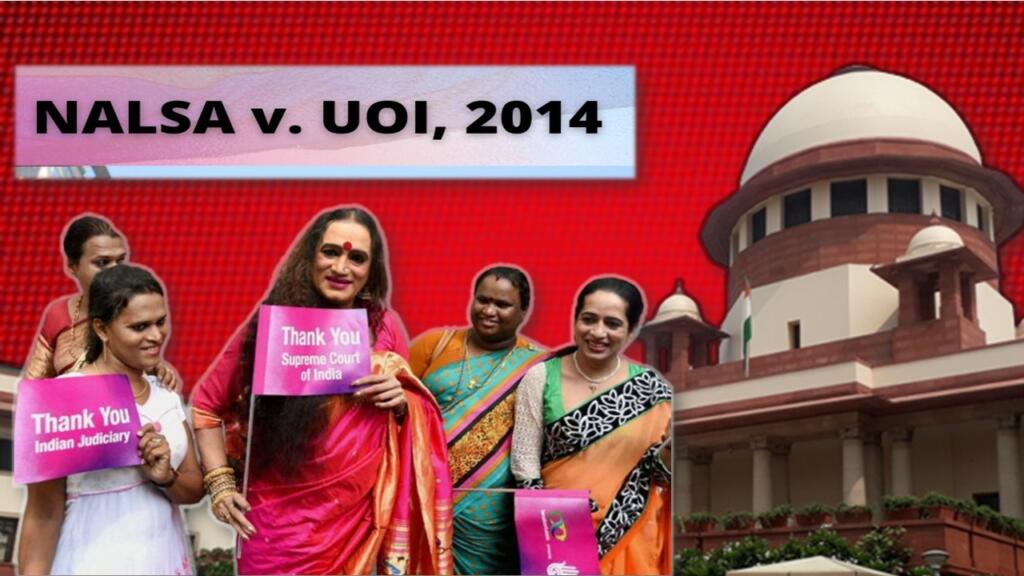National Legal Services Authority vs Union of India case: It is really a travesty of justice if everyone in society does not get equal rights. Somehow, more than six decades after our independence, transgenders were living under Victorian-sanctioned tyranny. They did not even get their due recognition. Thankfully, it ended in 2014.
Petition for recognition of transgenders
A writ petition regarding equal rights for transgender people was filed in the Supreme Court by the National Legal Services Authority (NALSA). Renowned activists Laxmi Narayan Tripathy and Poojaya Mata Nasib Kaur Ji of the Women Welfare Society were also parties to the writ. The opposing party was the Union of India in National Legal Services Authority vs Union of India case. Though it is pertinent to note that the Union of India got dragged into it due to getting caught napping on transgender rights, they did not really oppose the contentions raised by writ petitioners.
Petitioners demanded equal protection of the law for transgenders and various others falling under the LGBT spectrum. These include hijras, eunuchs, people who have changed their genders after reassignment surgeries, Kothis, Aravanis, Jogappas, and Shiv-Shakthis, among others.
Petitioners want the restoration of fundamental rights for them, as most of these categories of people have been facing social ostracization since the British era. The British had introduced the Criminal Tribes Act, 1871, and IPC Section 377 in order to vilify them for the Indian masses.
Also read: Jallikattu is legally and morally the right of Tamils
Discrimination is not in consonance with fundamental rights
Clearly, Indic ethos do not prescribe such type of discrimination. Unfortunately, the Apex Court had to go in-depth into Indian history to substantiate its point for the gullible masses. Justice K.S. Radhakrishnan pointed out that the concept of “tritiya prakriti” or “napunsakta” has been an integral part of Indian society. Incidents from the Ramayana, Mahabharata, and Jain texts were also cited to support the argument about their inclusion in Indian society. In the same breath, we also learned that Justice explained how the British brought a forcible end to this glorious tradition.
Somehow, things had not changed much in independent India. The Apex Court read and elaborated fundamental rights provisions to end discrimination. Articles 15 and 16 prohibit any discrimination on the basis of sex.
Giving a refreshing understanding of this prohibition, the Court ruled that the word “sex” does not only refer to the biological sex of the person. It held that it includes those who do not identify as either male or female.
A similar interpretation was also given to the use of the word “person” in Articles 14 and 19 as well. Article 14 prescribes equal protection to every “person.” However, the word “person” also includes Hijras and transgender people.
Regarding Article 19(1)(a), the Court held that the word “citizen” used in the said article can mean anyone, including people of any self-identifying gender. In the Court’s words, “self-identified gender can be expressed through dress, words, action, behavior, or any other form.”
All these provisions were read along with the “Right to Life” part of the Indian Constitution under Article 21. Rights under Article 21 were reiterated as consisting of the right to live with dignity as a self-recognized gender.
SRS is not a legal route
However, the Court took a bit of a cautious approach regarding self-recognised gender. It acknowledged that people who do not have established psychological connections with the sex assigned at birth do exist. Furthermore, it acknowledged the fact that the gender binary is not universal.Therefore, it refused to accept the Corbett principle of biological testing. Instead, the apex court put emphasis on “psychological test” instead of “biological test.”
It went deep into the length and breadth of precedents set in the US, Germany, the UK, Australia, and other countries. Case laws as well as legislation established in those jurisdictions were given an in-depth reading. UN conventions were also brought into the picture.
Also read: The love jihad that wasn’t: The Akhila Hadiya case
Based on the understandings developed, the Court did not find it wise to legalise sex reassignment surgery as a condition for changing gender. In its judgement, the Court asked the government to recognise the third gender. The Supreme Court also ordered that the third gender be allowed to participate in society in accordance with Articles 14, 15, 16, 19, 21, 51, and 253 of the Constitution.
Support TFI:
Support us to strengthen the ‘Right’ ideology of cultural nationalism by purchasing the best quality garments from TFI-STORE.COM
Also Watch:
https://www.youtube.com/watch?v=LtZEIXwTPC8
